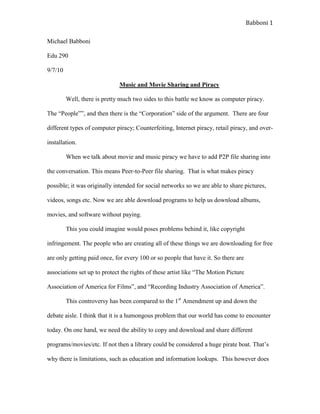
Edu 290 internet piracy
- 1. Michael Babboni <br />Edu 290 <br />9/7/10<br />Music and Movie Sharing and Piracy<br />Well, there is pretty much two sides to this battle we know as computer piracy. The “People””, and then there is the “Corporation” side of the argument. There are four different types of computer piracy; Counterfeiting, Internet piracy, retail piracy, and over-installation. <br />When we talk about movie and music piracy we have to add P2P file sharing into the conversation. This means Peer-to-Peer file sharing. That is what makes piracy possible; it was originally intended for social networks so we are able to share pictures, videos, songs etc. Now we are able download programs to help us download albums, movies, and software without paying. <br />This you could imagine would poses problems behind it, like copyright infringement. The people who are creating all of these things we are downloading for free are only getting paid once, for every 100 or so people that have it. So there are associations set up to protect the rights of these artist like “The Motion Picture Association of America for Films”, and “Recording Industry Association of America”. <br />This controversy has been compared to the 1st Amendment up and down the debate aisle. I think that it is a humongous problem that our world has come to encounter today. On one hand, we need the ability to copy and download and share different programs/movies/etc. If not then a library could be considered a huge pirate boat. That’s why there is limitations, such as education and information lookups. This however does not solve the problem, because the musicians and movie stars and directors are not getting paid as much as they are used to, on the count of P2P sharing. <br />Work Cited<br />www.epic.org 10/7/10<br />www.brightbulb.com : Victoria Roddel, 4/20/09<br />www.riaa.com<br />www.mpaa.org<br />Michael Babboni <br />EDU 290 <br />9/7/10<br />Filtering of the Internet<br />Do you think the Internet should be filtered? If so, then by who? for who? This is the controversy that is sparked upon us. These days there really isn’t a filter on what you can put on the internet, however there are many dollars put into the idea on filtering the internet on its way to your screen. <br />This has been brought up threw the supreme court and the only thing they got out of it was, Libraries have to have a certified anti-pornography filter or they will not receive government funding, and in some states libraries and schools have to do this. The CIPA, children Internet protection act was first enacted in 2000 by congress, this was basically and act to promote technology in the classroom. Bringing grants and discounts from the government, of course the schools are going to cooperate with them. If not there school could go to trash. <br />When we talk about if we should or shouldn’t filter the Internet? I feel like we are just wasting our time, because the only way the Internet is going to become censored, is if we want it to. If I have a child at home, and I don’t want him to be subject to what’s on the internet , then it wont happen, at my home. Once he leaves and he goes to his friends house though, there is no telling what he will see and find. <br />Work Cited<br />www.ncls.org<br />www.google.com<br />Michael Babboni<br />EDU 290<br />9/7/10<br />Use of New Technologies in Classrooms<br />The uses of new technologies in the classrooms have its advantages and disadvantages in my opinion. The advantages seem to out way at this point, and the rest of the educational community would agree with that I’m fairly confident. It does not only makes more students motivated about learning, but it also makes teachers jobs easier. <br />When you have technologies like we do today it would almost be stupid to not use them as a benefiting factor for educating the youth. You can place these children in real life occurrences while never leaving the classroom. You can have a child turn in a essay otherwise would have gotten a zero for. You can make so much convenience out of it why wouldn’t you want to use it?<br />It has thought to have even improved ones self-esteem, design skills and collaboration with peers. With it being free and so easy to access it has spread like wildfire. Kids using Firefox, Google, and even Facebook for educational use it’s a daily occurrence for all of us. <br />There are so many sites for educational uses on the Internet, that the common person would probably only know 2 or 3 of the top 100. Even when we get away from the Internet there is still so many opportunities to learn threw technology. There are gps’s, calculators, itouch, personal computers, and even cell phones can teach you a thing or two. The point is no mater where you go there is new innovations everyday, why not teach with them?<br />Work Cited<br />http://www2.ed.gov/pubs/EdReformStudies/EdTech/effectsstudents.html<br />www.google.com<br />
